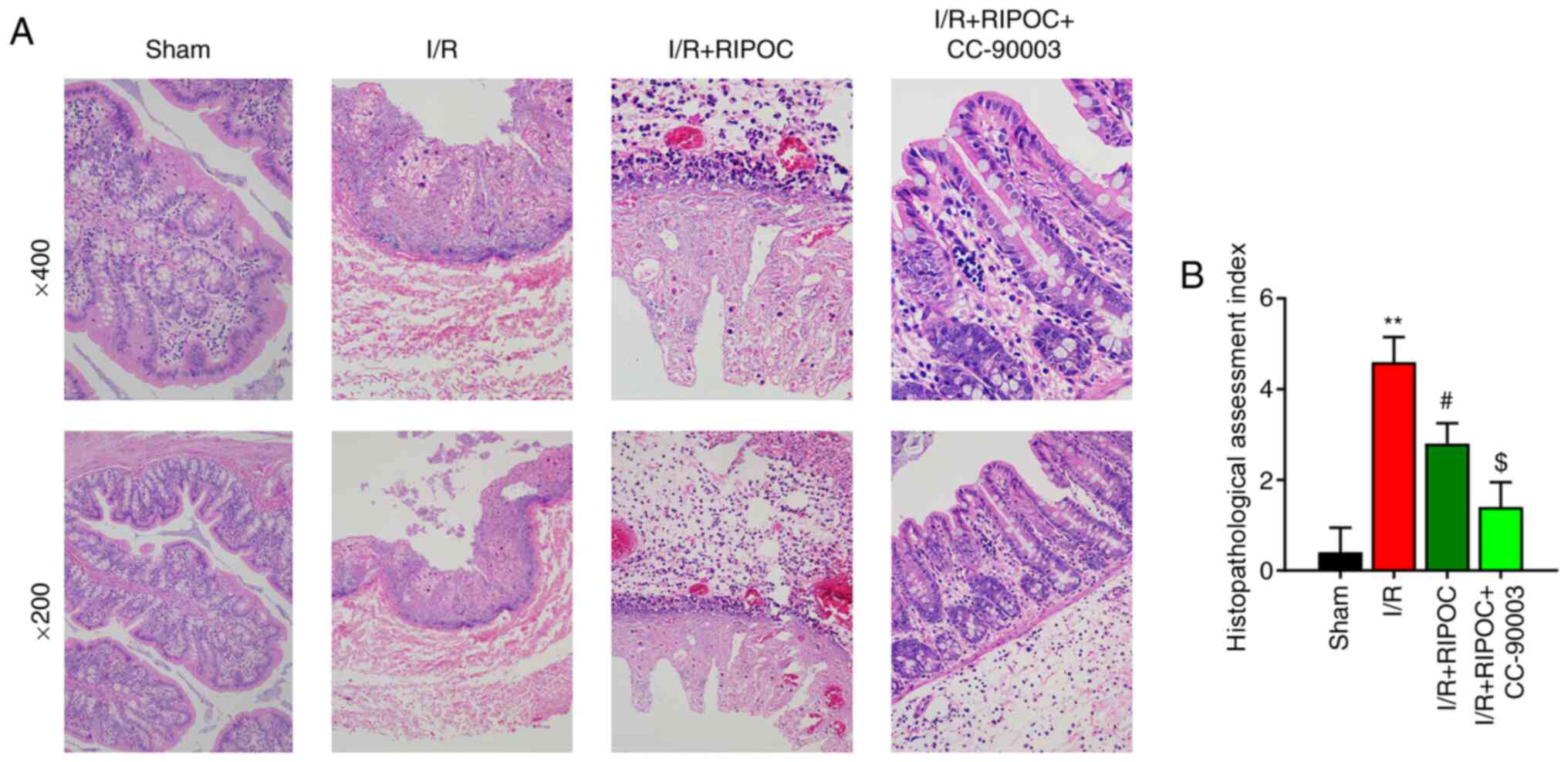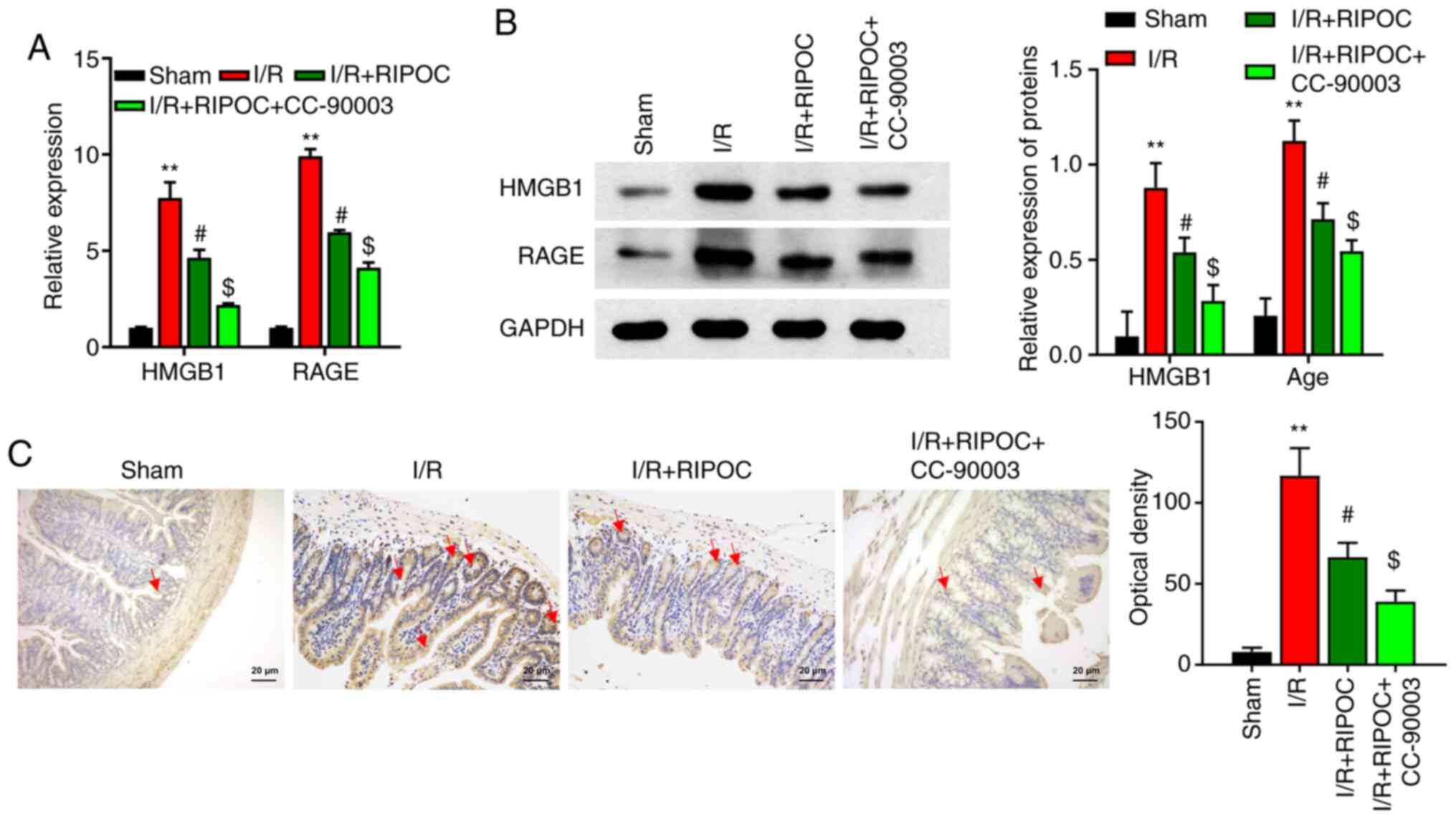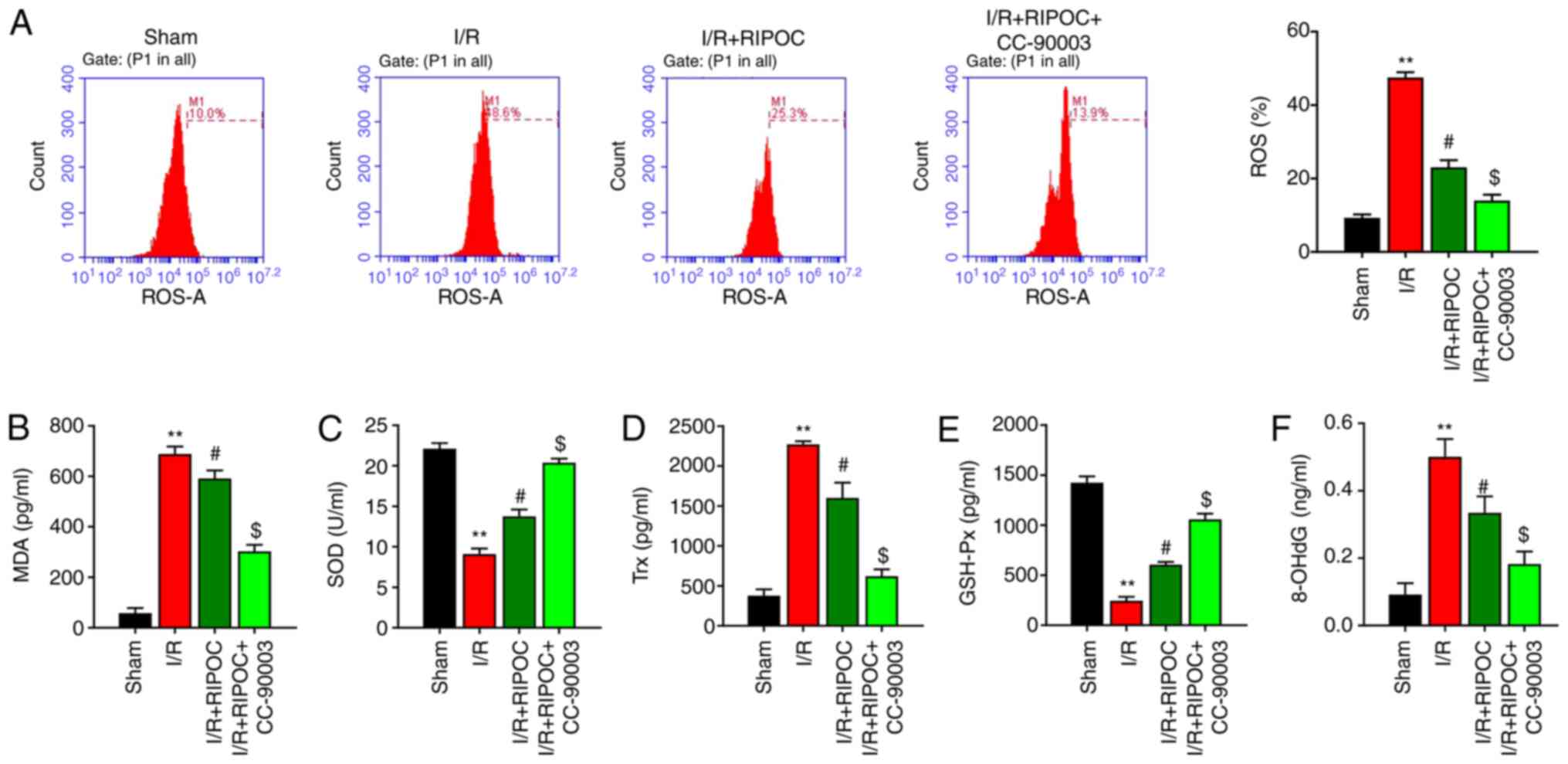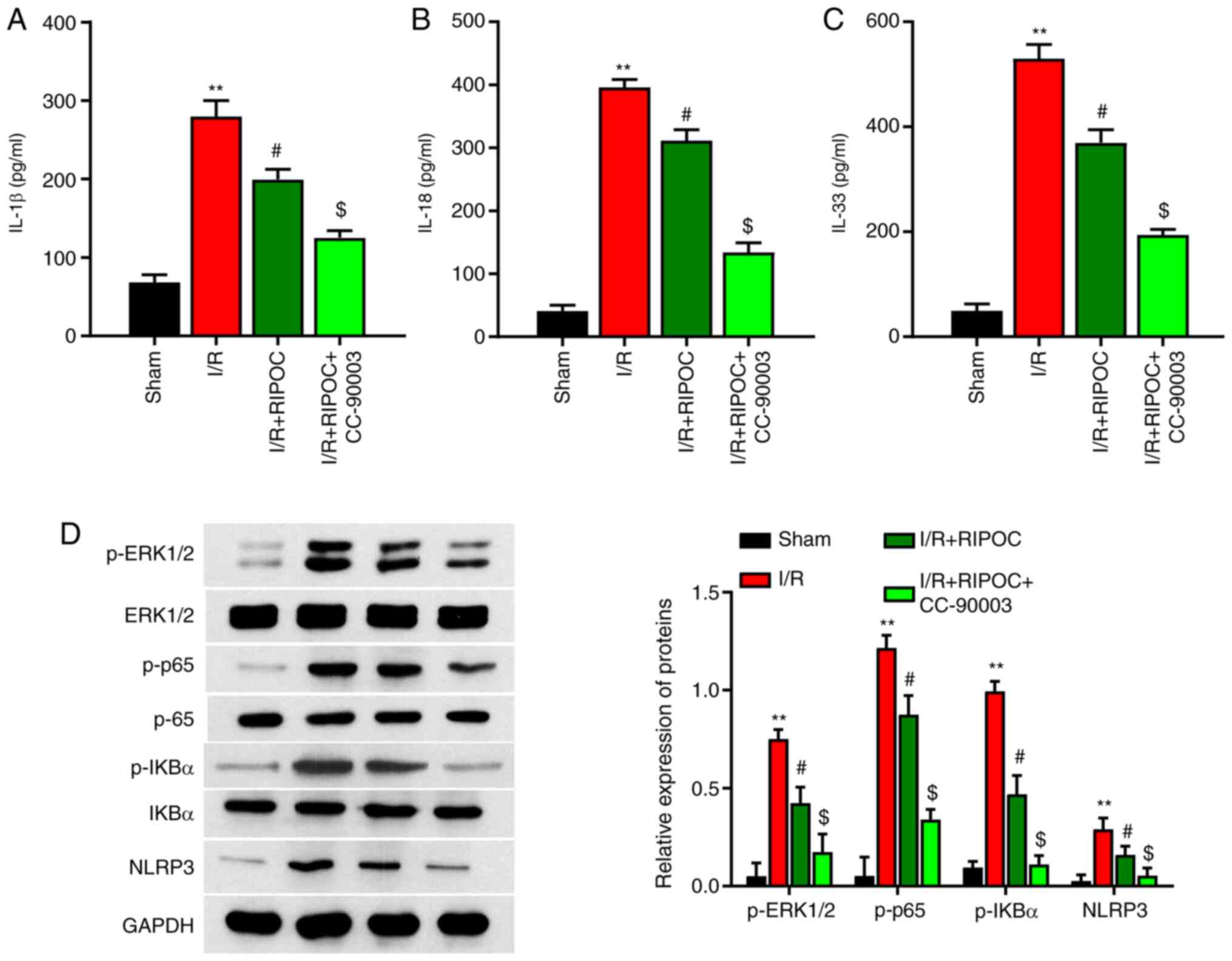|
1
|
Gonzalez LM, Moeser AJ and Blikslager AT:
Animal models of ischemia-reperfusion-induced intestinal injury:
Progress and promise for translational research. Am J Physiol
Gastrointest Liver Physiol. 308:G63–G75. 2015. View Article : Google Scholar : PubMed/NCBI
|
|
2
|
Hu Q, Ren H, Ren J, Liu Q, Wu J, Wu X, Li
G, Wang G, Gu G, Guo K, et al: Released mitochondrial DNA following
intestinal ischemia reperfusion induces the inflammatory response
and gut barrier dysfunction. Sci Rep. 8:73502018. View Article : Google Scholar : PubMed/NCBI
|
|
3
|
Wang M, Verhaegh R, Tsagakis K, Brencher
L, Zwanziger D, Jakob HG, Groot H and Dohle DS: Impact of acute
intestinal ischemia and reperfusion injury on hemodynamics and
remote organs in a rat model. Thorac Cardiovasc Surg. 66:99–108.
2018. View Article : Google Scholar : PubMed/NCBI
|
|
4
|
Ferrada P, Wolfe L, Duchesne J, Fraga GP,
Benjamin E, Alvarez A, Campbell A, Wybourn C, Garcia A, Morales C,
et al: Management of duodenal trauma: A retrospective review from
the Panamerican Trauma Society. J Trauma Acute Care Surg.
86:392–396. 2019. View Article : Google Scholar : PubMed/NCBI
|
|
5
|
Li J, Kong P, Chen C, Tang J, Jin X, Yan J
and Wang Y: Targeting IL-17A improves the dysmotility of the small
intestine and alleviates the injury of the interstitial cells of
cajal during sepsis. Oxid Med Cell Longev. 2019:14757292019.
View Article : Google Scholar : PubMed/NCBI
|
|
6
|
Mester A, Magyar Z, Sogor V, Tanczos B,
Stark Y, Cherniavsky K, Bidiga L, Peto K and Nemeth N: Intestinal
ischemia-reperfusion leads to early systemic micro-rheological and
multiorgan microcirculatory alterations in the rat. Clin Hemorheol
Microcirc. 68:35–44. 2018. View Article : Google Scholar : PubMed/NCBI
|
|
7
|
Ameli M, Hashemi MS, Moghimian M and
Shokoohi M: Protective effect of tadalafil and verapamil on
testicular function and oxidative stress after torsion/detorsion in
adult male rat. Andrologia. 50:e130682018. View Article : Google Scholar : PubMed/NCBI
|
|
8
|
Jia Z, Lian W, Shi H, Cao C, Han S, Wang
K, Li M and Zhang X: Ischemic post-conditioning protects against
intestinal ischemia/reperfusion injury via the HIF-1α/miR-21 axis.
Sci Rep. 7:161902017. View Article : Google Scholar : PubMed/NCBI
|
|
9
|
Sheu EG, Wakatsuki K, Oakes S, Carroll MC
and Moore FD Jr: Prevention of intestinal ischemia-reperfusion
injury in humanized mice. Surgery. 160:436–442. 2016. View Article : Google Scholar : PubMed/NCBI
|
|
10
|
Giannopoulos G, Vrachatis DA, Panagopoulou
V, Vavuranakis M, Cleman MW and Deftereos S: Remote ischemic
conditioning and renal protection. J Cardiovasc Pharmacol Ther.
22:321–329. 2017. View Article : Google Scholar : PubMed/NCBI
|
|
11
|
Heusch G: Remote ischemic conditioning in
cardiovascular surgery. J Cardiovasc Pharmacol Ther. 22:297–301.
2017. View Article : Google Scholar : PubMed/NCBI
|
|
12
|
Przyklenk K, Bauer B, Ovize M, Kloner RA
and Whittaker P: Regional ischemic ‘preconditioning’ protects
remote virgin myocardium from subsequent sustained coronary
occlusion. Circulation. 87:893–899. 1993. View Article : Google Scholar : PubMed/NCBI
|
|
13
|
Kharbanda RK, Mortensen UM, White PA,
Kristiansen SB, Schmidt MR, Hoschtitzky JA, Vogel M, Sorensen K,
Redington AN and MacAllister R: Transient limb ischemia induces
remote ischemic preconditioning in vivo. Circulation.
106:2881–2883. 2002. View Article : Google Scholar : PubMed/NCBI
|
|
14
|
Anttila V, Haapanen H, Yannopoulos F,
Herajärvi J, Anttila T and Juvonen T: Review of remote ischemic
preconditioning: From laboratory studies to clinical trials. Scand
Cardiovasc J. 50:355–361. 2016. View Article : Google Scholar : PubMed/NCBI
|
|
15
|
Gill R, Kuriakose R, Gertz ZM, Salloum FN,
Xi L and Kukreja RC: Remote ischemic preconditioning for myocardial
protection: Update on mechanisms and clinical relevance. Mol Cell
Biochem. 402:41–49. 2015. View Article : Google Scholar : PubMed/NCBI
|
|
16
|
Guo H, Zhao L, Wang B, Li X, Bai H, Liu H,
Yue L, Guo W, Bian Z, Gao L, et al: Remote limb ischemic
post-conditioning protects against cerebral ischemia-reperfusion
injury by activating AMPK-dependent autophagy. Brain Res Bull.
139:105–113. 2018. View Article : Google Scholar : PubMed/NCBI
|
|
17
|
Jiang Q, Yu T, Huang K, Lu J, Zhang H and
Hu S: Remote ischemic post-conditioning ameliorates the mesenchymal
stem cells engraftment in reperfused myocardium. PLoS One.
11:e01460742016. View Article : Google Scholar : PubMed/NCBI
|
|
18
|
Wang S and Zhang Y: HMGB1 in inflammation
and cancer. J Hematol Oncol. 13:1162020. View Article : Google Scholar : PubMed/NCBI
|
|
19
|
Yang WS, Kim JJ, Lee MJ, Lee EK and Park
SK: Ectodomain shedding of RAGE and TLR4 as a negative feedback
regulation in high-mobility group box 1-activated aortic
endothelial cells. Cell Physiol Biochem. 51:1632–1644. 2018.
View Article : Google Scholar : PubMed/NCBI
|
|
20
|
Bangert A, Andrassy M, Müller AM,
Bockstahler M, Fischer A, Volz CH, Leib C, Göser S, Korkmaz-Icöz S,
Zittrich S, et al: Critical role of RAGE and HMGB1 in inflammatory
heart disease. Proc Natl Acad Sci USA. 113:E155–E164. 2016.
View Article : Google Scholar : PubMed/NCBI
|
|
21
|
Mou K, Liu W, Han D and Li P: HMGB1/RAGE
axis promotes autophagy and protects keratinocytes from ultraviolet
radiation-induced cell death. J Dermatol Sci. 85:162–169. 2017.
View Article : Google Scholar : PubMed/NCBI
|
|
22
|
Qiu Y, Chen Y, Zeng T, Guo W, Zhou W and
Yang X: High-mobility group box-B1 (HMGB1) mediates the
hypoxia-induced mesenchymal transition of osteoblast cells via
activating ERK/JNK signaling. Cell Biol Int. 40:1152–1161. 2016.
View Article : Google Scholar : PubMed/NCBI
|
|
23
|
Chiu CJ, McArdle AH, Brown R, Scott HJ and
Gurd FN: Intestinal mucosal lesion in low-flow states. I. A
morphological, hemodynamic, and metabolic reappraisal. Arch Surg.
101:478–483. 1970. View Article : Google Scholar : PubMed/NCBI
|
|
24
|
Qu H, Yin H, Yan S, Tao M, Xie Y and Chen
W: Inhibitor of growth 4 suppresses colorectal cancer growth and
invasion by inducing G1 arrest, inhibiting tumor angiogenesis and
reversing epithelial-mesenchymal transition. Oncol Rep.
35:2927–2935. 2016. View Article : Google Scholar : PubMed/NCBI
|
|
25
|
Ma X, Du T, Zhu D, Chen X, Lai Y, Wu W,
Wang Q, Lin C, Li Z, Liu L, et al: High levels of glioma tumor
suppressor candidate region gene 1 predicts a poor prognosis for
prostate cancer. Oncol Lett. 16:6749–6755. 2018.PubMed/NCBI
|
|
26
|
Livak KJ and Schmittgen TD: Analysis of
relative gene expression data using real-time quantitative PCR and
the 2(-Delta Delta C(T)) method. Methods. 25:402–408. 2001.
View Article : Google Scholar : PubMed/NCBI
|
|
27
|
Gubernatorova EO, Perez-Chanona E,
Koroleva EP, Jobin C and Tumanov AV: Murine model of intestinal
ischemia-reperfusion injury. J Vis Exp. 111:538812016.PubMed/NCBI
|
|
28
|
Zhang Y, Zulfiqar M, Bluth MH, Bhalla A
and Beydoun R: Molecular diagnostics in the neoplasms of small
intestine and appendix: 2018 update. Clin Lab Med. 38:343–355.
2018. View Article : Google Scholar : PubMed/NCBI
|
|
29
|
Volk N and Lacy B: Anatomy and physiology
of the small bowel. Gastrointest Endosc Clin N Am. 27:1–13. 2017.
View Article : Google Scholar : PubMed/NCBI
|
|
30
|
Zhang X, Moriwaki T, Kawabata T, Goto S,
Liu KX, Guo CY and Li TS: Nicaraven attenuates post-operative
systemic inflammatory responses-induced tumor metastasis. Ann Surg
Oncol. 27:1068–1074. 2020. View Article : Google Scholar : PubMed/NCBI
|
|
31
|
Li X, Ling Y, Cao Z, Shen J, Chen S, Liu
W, Yuan B and Wen S: Targeting intestinal epithelial
cell–programmed necrosis alleviates tissue injury after intestinal
ischemia/reperfusion in rats. J Surg Res. 225:108–117. 2018.
View Article : Google Scholar : PubMed/NCBI
|
|
32
|
Hummitzsch L, Zitta K, Berndt R, Wong YL,
Rusch R, Hess K, Wedel T, Gruenewald M, Cremer J, Steinfath M, et
al: Remote ischemic preconditioning attenuates intestinal mucosal
damage: Insight from a rat model of ischemia-reperfusion injury. J
Transl Med. 17:1362019. View Article : Google Scholar : PubMed/NCBI
|
|
33
|
Peng B, Guo QL, He ZJ, Ye Z, Yuan YJ, Wang
N and Zhou J: Remote ischemic post-conditioning protects the brain
from global cerebral ischemia/reperfusion injury by up-regulating
endothelial nitric oxide synthase through the PI3K/Akt pathway.
Brain Res. 1445:92–102. 2012. View Article : Google Scholar : PubMed/NCBI
|
|
34
|
Zhao JJ, Xiao H, Zhao WB, Zhang XP, Xiang
Y, Ye ZJ, Mo MM, Peng XT and Wei L: Remote ischemic
post-conditioning for ischemic stroke: A systematic review and
meta-analysis of randomized controlled trials. Chin Med J (Engl).
131:956–965. 2018. View Article : Google Scholar : PubMed/NCBI
|
|
35
|
Liang D, He XB, Wang Z, Li C, Gao BY, Wu
JF and Bai YL: Remote limb ischemic post-conditioning promotes
motor function recovery in a rat model of ischemic stroke via the
up-regulation of endogenous tissue kallikrein. CNS Neurosci Ther.
24:519–527. 2018. View Article : Google Scholar : PubMed/NCBI
|
|
36
|
Wang X, Wang J, Tu T, Iyan Z, Mungun D,
Yang Z and Guo Y: Remote ischemic post-conditioning protects
against myocardial ischemia-reperfusion injury by inhibition of the
RAGE-HMGB1 pathway. BioMed Res Int. 2018:45656302018.PubMed/NCBI
|
|
37
|
Zhang ZX, Li H, He JS, Chu HJ, Zhang XT
and Yin L: Remote ischemic post-conditioning alleviates myocardial
ischemia/reperfusion injury by up-regulating ALDH2. Eur Rev Med
Pharmacol Sci. 22:6475–6484. 2018.PubMed/NCBI
|
|
38
|
Ghaffari S, Pourafkari L, Manzouri S and
Nader ND: Effect of remote ischemic post-conditioning during
thrombolysis in STEMI. Herz. 43:161–168. 2018. View Article : Google Scholar : PubMed/NCBI
|
|
39
|
Zhang Y, Xu H, Wang T, He J, Wei J, Wang T
and Dong J: Remote limb ischemic post-conditioning attenuates
ischemia-reperfusion injury in rat skin flapby limiting oxidative
stress. Acta Cir Bras. 31:15–21. 2016. View Article : Google Scholar : PubMed/NCBI
|
|
40
|
Ramagiri S and Taliyan R: Protective
effect of remote limb post-conditioning via upregulation of heme
oxygenase-1/BDNF pathway in rat model of cerebral ischemic
reperfusion injury. Brain Res. 1669:44–54. 2017. View Article : Google Scholar : PubMed/NCBI
|
|
41
|
Ren G, Yuan X, Zhao X, Hao Q, Cao J, Wang
Y, Gao Q, Dou J and Zeng Q: Characterization and evolution of
intestine injury at the anhepatic phase in portal hypertensive
rats. Exp Ther Med. 16:4765–4771. 2018.PubMed/NCBI
|
|
42
|
Jiang Q: Research progress on intestinal
barrier dysfunction and treatment of severe acute pancreatitis. Adv
Emerg Med. 6:1–6. 2017.
|
|
43
|
Mason RP: Imaging free radicals in
organelles, cells, tissue, and in vivo with immuno-spin trapping.
Redox Biol. 8:422–429. 2016. View Article : Google Scholar : PubMed/NCBI
|
|
44
|
Goc Z, Szaroma W, Kapusta E and Dziubek K:
Protective effects of melatonin on the activity of SOD, CAT, GSH-Px
and GSH content in organs of mice after administration of SNP. Chin
J Physiol. 60:1–10. 2017. View Article : Google Scholar : PubMed/NCBI
|
|
45
|
Huo Y, Liu S-X, Li L, Feng J, Li H-Y and
Song G-Y: Circulating vaspin and IL-6 concentrations in second
trimester pregnancy with gestational diabetes. Clin Exp Obstet
Gynecol. 46:211–215. 2019.
|
|
46
|
Opal SM and DePalo VA: Anti-inflammatory
cytokines. Chest. 117:1162–1172. 2000. View Article : Google Scholar : PubMed/NCBI
|
|
47
|
Shi C, Wang Q, Rao Z, Shi Y, Wei S, Wang
H, Lu X, Wang P, Lu L, Zhou H, et al: Diabetes induces hepatocyte
pyroptosis by promoting oxidative stress-mediated NLRP3
inflammasome activation during liver ischaemia and reperfusion
injury. Ann Transl Med. 8:7392020. View Article : Google Scholar : PubMed/NCBI
|
|
48
|
Sun Y, Liu WZ, Liu T, Feng X, Yang N and
Zhou HF: Signaling pathway of MAPK/ERK in cell proliferation,
differentiation, migration, senescence and apoptosis. J Recept
Signal Transduct Res. 35:600–604. 2015. View Article : Google Scholar : PubMed/NCBI
|
|
49
|
Tirone M, Tran NL, Ceriotti C, Gorzanelli
A, Canepari M, Bottinelli R, Raucci A, Di Maggio S, Santiago C,
Mellado M, et al: High-mobility group box 1 orchestrates tissue
regeneration via CXCR4. J Exp Med. 215:303–318. 2018. View Article : Google Scholar : PubMed/NCBI
|
|
50
|
Bianchi ME, Crippa MP, Manfredi AA,
Mezzapelle R, Rovere Querini P and Venereau E: High-mobility group
box 1 protein orchestrates responses to tissue damage via
inflammation, innate and adaptive immunity, and tissue repair.
Immunol Rev. 280:74–82. 2017. View Article : Google Scholar : PubMed/NCBI
|
|
51
|
Yang M, Ruidi A, Minghang L, Tian X, Lu X
and Dong Z: β-caryophyllene mitigates cerebral ischemia reperfusion
injury in mice by inhibiting HMGB1/TLR4/NF-κB pathway. Chin J
Immunol. 33:1009–1013. 2017.
|
|
52
|
Dong LY, Chen F, Xu M, Yao LP, Zhang YJ
and Zhuang Y: Quercetin attenuates myocardial ischemia-reperfusion
injury via downregulation of the HMGB1-TLR4-NF-κB signaling
pathway. Am J Transl Res. 10:1273–1283. 2018.PubMed/NCBI
|
|
53
|
Xie W, Zhu T, Dong X, Nan F, Meng X, Zhou
P, Sun G and Sun X: HMGB1-triggered inflammation inhibition of
notoginseng leaf triterpenes against cerebral ischemia and
reperfusion injury via MAPK and NF-κB signaling pathways.
Biomolecules. 9:5122019. View Article : Google Scholar : PubMed/NCBI
|
|
54
|
Yu Q, Wu L, Liu T, Li S, Feng J, Mao Y,
Fan X, Guo C and Wu J: Protective effects of
levo-tetrahydropalmatine on hepatic ischemia/reperfusion injury are
mediated by inhibition of the ERK/NF-κB pathway. Int
Immunopharmacol. 70:435–445. 2019. View Article : Google Scholar : PubMed/NCBI
|
|
55
|
Wu L, Zhang Q, Dai W, Li S, Feng J, Li J,
Liu T, Xu S, Wang W, Lu X, et al: Quercetin pretreatment attenuates
hepatic ischemia reperfusion-induced apoptosis and autophagy by
inhibiting ERK/NF-κB Pathway. Gastroenterol Res Pract.
9724217:20172017.PubMed/NCBI
|
|
56
|
Nielsen MB, Krogstrup NV, Oltean M,
Nieuwenhuijs-Moeke GJ, Dor FJMF, Birn H and Jespersen B: Remote
ischaemic conditioning and early changes in plasma creatinine as
markers of one year kidney graft function-A follow-up of the
CONTEXT study. PLoS One. 14:e02268822019. View Article : Google Scholar : PubMed/NCBI
|


















